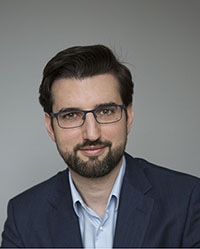Dr. Sergio Ioppolo is an Associate Professor within the Department of Physics and Astronomy at Aarhus University and a PI of the Center for Interstellar Catalysis (InterCat).
His research career began during his MSc in Physics and Astrophysics at Catania University in Italy with a thesis work in laboratory for astrochemistry. In December 2010, he was awarded a PhD in Astronomy at Leiden University in the Netherlands with a thesis supervised by Prof. Linnartz and Prof. van Dishoeck. Sergio’s PhD work focused on understanding the chemical origin of water, methanol, and carbon dioxide in space. For this work he was awarded the 2011 Dick Stufkens prize of the Holland Research School of Molecular Chemistry (HRSMC).
During his first postdoctoral position in Leiden, Sergio developed a novel UHV system specifically designed to investigate the formation of complex organic molecules in space (SURFRESIDE2). In 2011, Sergio was awarded the Niels Stensen Fellowship and a Marie Curie IOF, which he both held at Caltech in the USA, where he applied novel THz spectroscopic techniques to study interstellar ices. In 2014, the return phase of his Marie Curie programme was carried-out at the Institute of Molecules and Materials within the group of Prof. Cuppen and at the free-electron laser FELIX Laboratory facility of the Radboud University Nijmegen in the Netherlands. Since the beginning of his Royal Society University Research Fellowship at the Open University (OU) in the UK in 2015, he has engaged in a series of activities to establish himself among the UK Astrophysics and THz communities while continuing to maintain links and collaborations across Europe and USA. For his collaboration with the Leiden Laboratory for Astrophysics group, in 2015 and 2017, he was awarded the HRSMC Fellowships.
As a research leader of the Laboratory Astrophysics at the OU, Sergio transformed the laboratory space into a user facility for the investigation of physicochemical systems relevant to Space Sciences. At the same time, he led international teams in new research projects at the international HFML-FELIX Laboratory (Netherlands), RAL Space (UK), and ASTRID2 (Denmark) facilities. Since 2016, Sergio is an ordinary member of the Astrochemistry Group of the Royal Society of Chemistry and Royal Astronomical Society committee.
In 2017, he moved to Queen Mary University of London (QMUL) as a lecturer within the Antennas & Electromagnetics Research group to further develop his link to the UK THz laboratory community. Sergio is currently the head scientist and sole responsible for the Laboratory Ice Surface Astrophysics (LISA) ultrahigh vacuum end station at HFML-FELIX Laboratory. In partnership with other international groups, he leads and manages the Ice Chemistry for Astrophysics (ICA), the Belfast Ice Chemistry for Astrophysics (BICA), and the upcoming Vertical Irradiation Chemistry for Astrophysics (VICA) end stations at ATOMKI in Hungary, and the Portable Astrochemistry Chamber (PAC) at ISA ASTRID2. He is PI and co-I of many approved projects at HFML-FELIX, ATOMKI, ASTRID2, and CSIC-ICMM in Madrid - the Stardust Machine (NANO meets ASTRO). He is also co-I and a laboratory coordinator of the JWST Director’s Discretionary Early Release Science (IceAge), and a co-I of the JWST Cycle 1 (It’s COMplicated) and the ALMA Cycle 7 (hot cores molecular survey).

1520-324 Ny Munkegade 120
DK-8000 Aarhus C